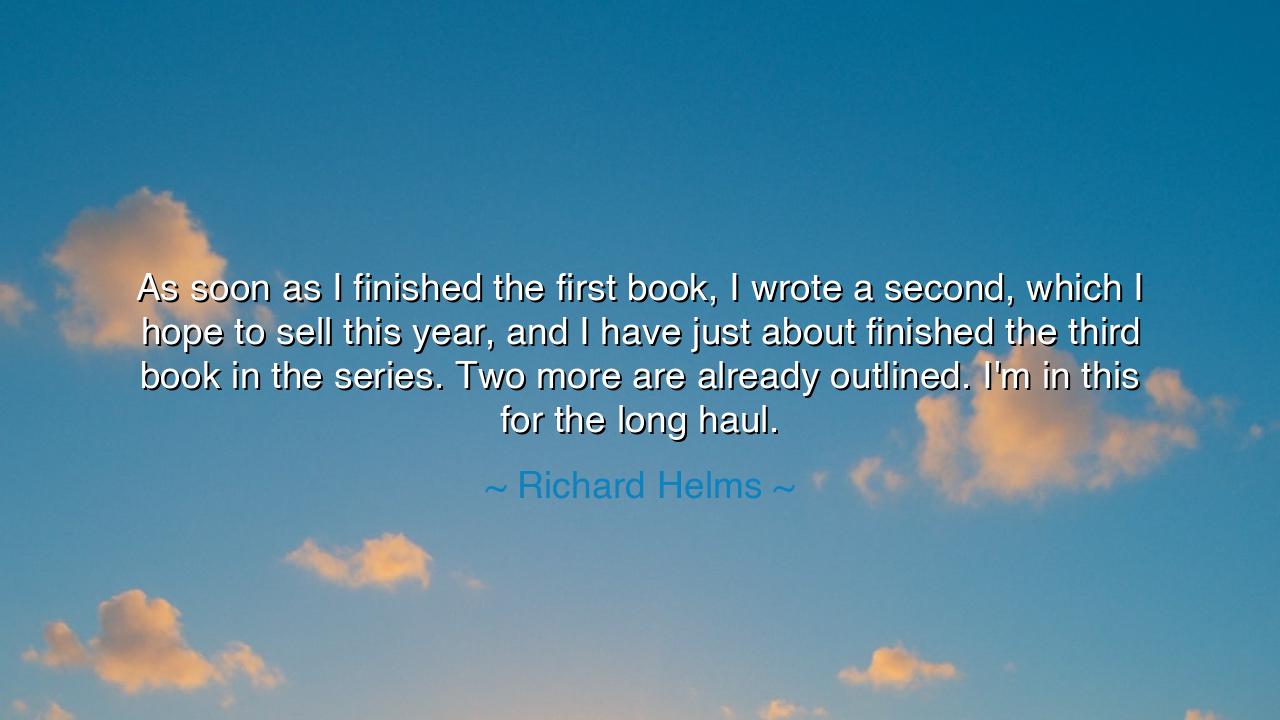
As soon as I finished the first book, I wrote a second, which I
As soon as I finished the first book, I wrote a second, which I hope to sell this year, and I have just about finished the third book in the series. Two more are already outlined. I'm in this for the long haul.






“As soon as I finished the first book, I wrote a second, which I hope to sell this year, and I have just about finished the third book in the series. Two more are already outlined. I’m in this for the long haul.” — thus spoke Richard Helms, a craftsman of stories and a warrior of perseverance. In these words, there is not merely the tale of an author’s journey, but the eternal rhythm of creation, patience, and devotion. It is a declaration of endurance — of a soul that refuses to yield before the vast mountain of time. To be in this for the long haul is to make a covenant with one’s purpose, a promise to continue even when the path grows steep and the reward lies far beyond the horizon.
This quote springs from the soil of persistence, that ancient virtue which has sustained all creators since the dawn of human striving. When Helms speaks of writing one book after another, of outlining yet more to come, he speaks not as one seeking quick triumph but as one devoted to the sacred labor of becoming. The ancients would have seen in him the likeness of a mason who lays stone upon stone, knowing that the temple he builds will not be completed in a single lifetime. His is the faith of those who work not for applause, but for endurance, for the quiet joy of progress made in solitude.
Consider the story of Michelangelo, who labored for years beneath the ceiling of the Sistine Chapel. Each day he painted until his hands ached and his neck stiffened, his vision clouded by fatigue and dust. Many mocked him for his slowness, for his refusal to rush what could not be rushed. Yet he persisted. He was, as Helms might say, in it for the long haul. And when the scaffolding was finally lowered, the world beheld a masterpiece born of patience and relentless will. From his brush we learn that greatness is not born in moments of inspiration, but in the discipline of daily effort.
So too, Helms’s declaration is a hymn to commitment — to the act of returning again and again to one’s work, even when the spark grows dim. To outline future books while still laboring over the current one is to see beyond the moment’s limits, to plant seeds for seasons yet to come. This is the mindset of the timeless builders of civilization — those who plant trees under whose shade they will never sit. Such men and women think in decades, not days. They understand that life’s greatest creations are forged through steady, unyielding hands.
But make no mistake — this is not the cold endurance of obligation; it is the passionate endurance of love. One cannot commit to such a path without being possessed by the fire of purpose. To write, to build, to create — and to do so again and again, regardless of recognition — is to love one’s craft as a mother loves her child, with both tenderness and fierce resolve. When Helms speaks of the “long haul,” he does not speak of suffering alone, but of a life entwined with meaning — a journey worth every ache, because it is guided by devotion.
From this, we learn that the road to mastery is neither short nor smooth. It demands that we rise each morning and give our labor to the unseen, the unfinished, the uncertain. And yet, it is through this very repetition that we find transcendence. Every word written, every stroke carved, every idea pursued — these are not steps away from our goal but steps deeper into ourselves. The long haul refines the soul, tempering it in the fires of patience and humility.
Let this be the lesson passed to those who seek greatness: do not chase swift victories, for they vanish like mist in the sun. Instead, dedicate yourself to the journey. Build slowly, with care. Let each effort be a stone in the monument of your purpose. When weariness comes, as it always will, remember that even the mightiest rivers are carved not by force, but by persistence.
And so, to those who would create, to those who would endure — take heart from Helms’s words. Begin your first work, and when it is done, begin your second. Dream of the third, and outline the fourth. Hold fast through the seasons, through the silence, through the doubt. For the true craftsman, the true soul of purpose, is not measured by what he finishes — but by his vow to stay the course, for the long haul, until time itself bears witness to his devotion.






AAdministratorAdministrator
Welcome, honored guests. Please leave a comment, we will respond soon